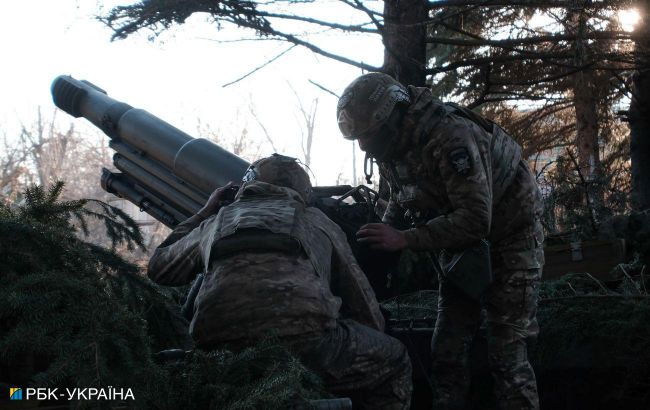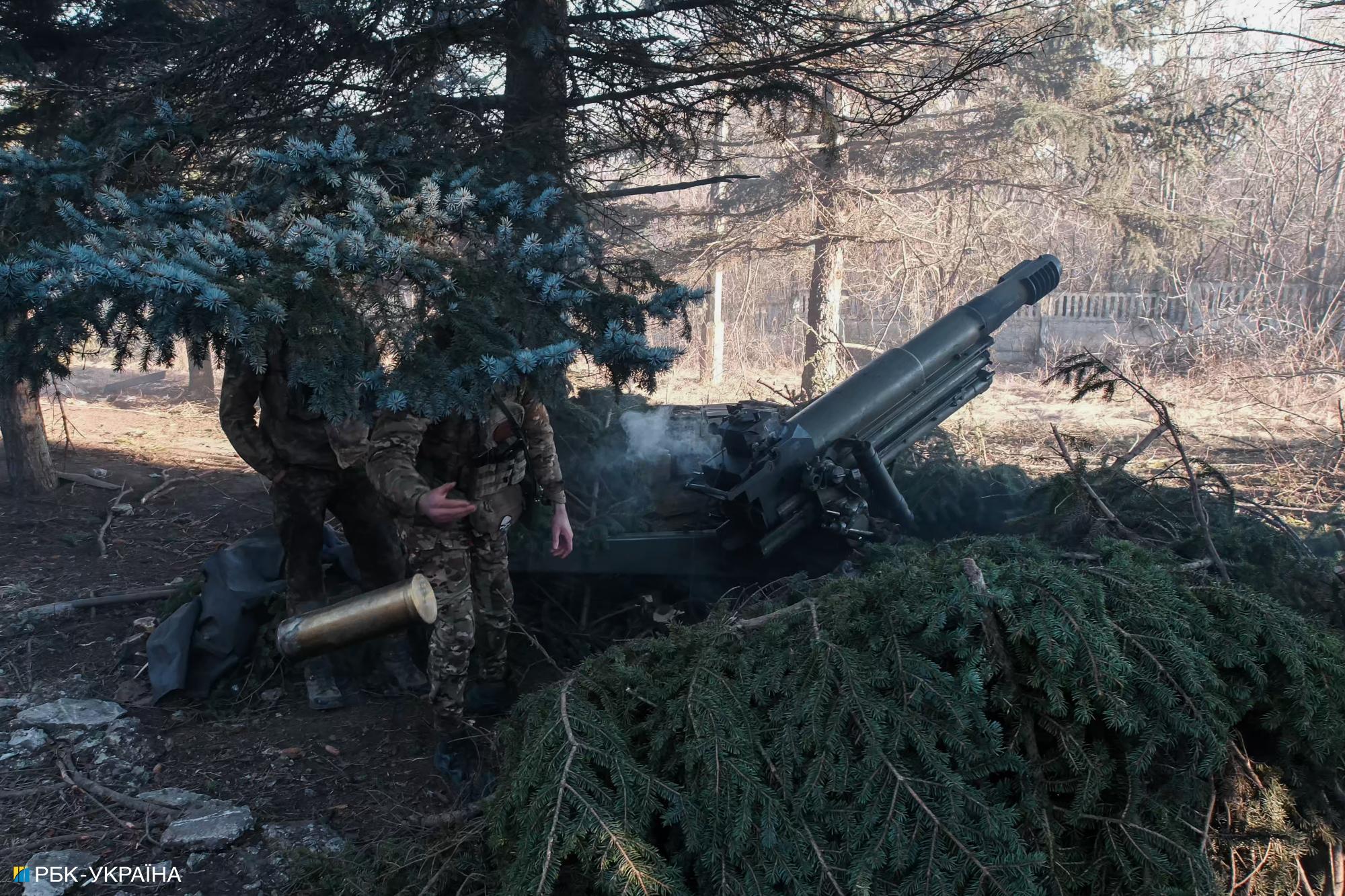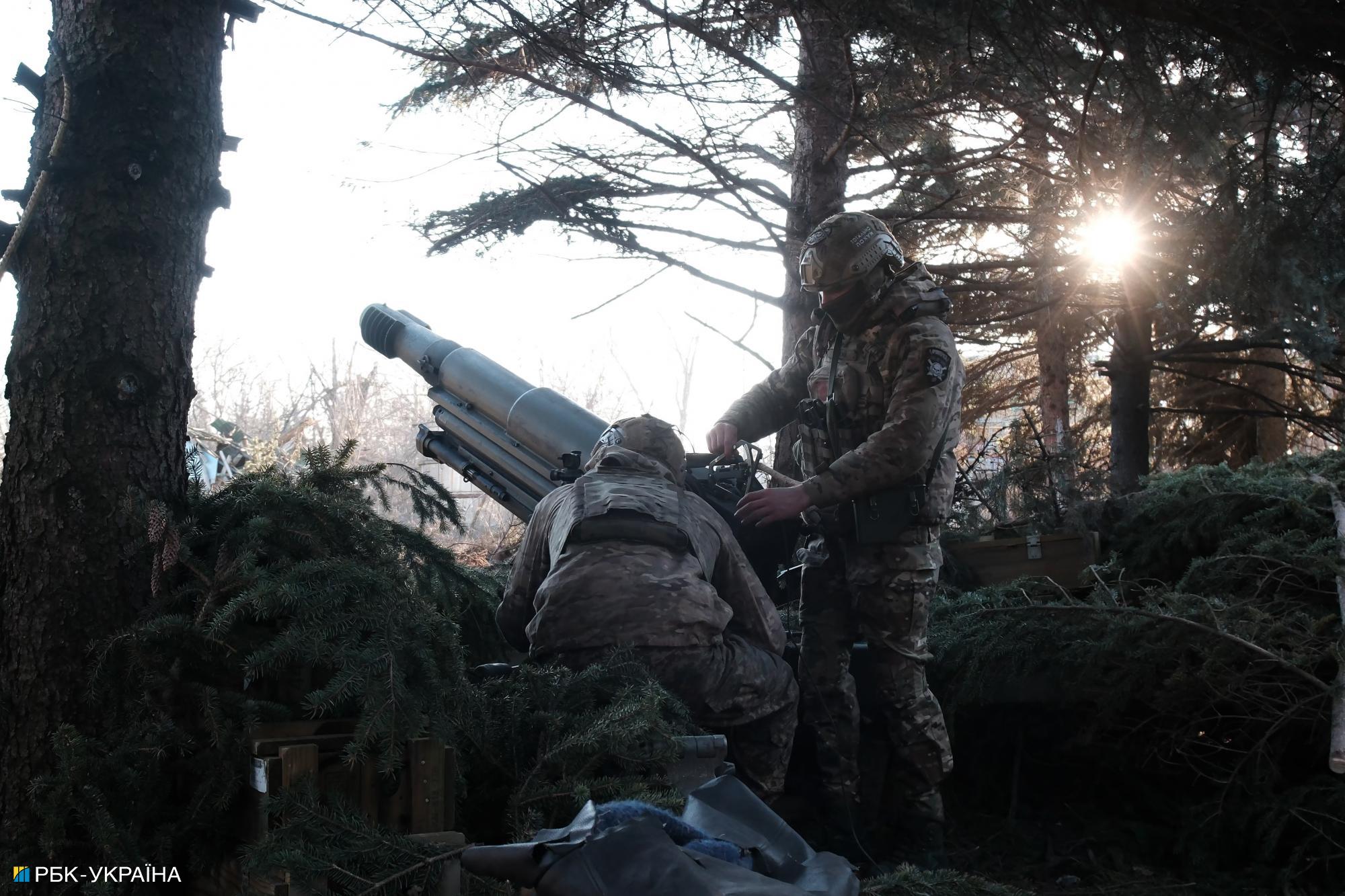'We save lives of our guys and take lives of occupiers,' Burevii brigade breaks up Russian columns
 Ukrainian artillerymen (photo: Vitalii Nosach / RBC-Ukraine)
Ukrainian artillerymen (photo: Vitalii Nosach / RBC-Ukraine)
Fighters of the Burevii (hurricane, whirlwind) brigade of the National Guard of Ukraine stand in defense along the Kreminna direction. Artillery units serve as the main defense and support for infantry both during assaults and during Russian advances. Accurate shots from the howitzer prevent the Russian army from approaching closer to the defensive positions. How artillery troops defeat the invaders - further in the report by RBC-Ukraine.
Life during wartime
The shattered train station of one of the many towns in the vast Donetsk region. Here, the war is sharper and louder than in the cities deeper into Ukraine - black tongues of flame on charred windows, broken roads, and the constant background noise of the front. No train has arrived here for a long time because there's no point in traveling to the city anymore - the tracks are completely dismantled all around.
But unexpectedly, it's quiet here in the morning - an hour of calm before dawn without shelling. This silence is oppressive because it forces one to listen closely - to where danger might come from. The city is still dark, and there's no communication. Since the beginning of the war, all infrastructure has been destroyed by the Russian army. There are no more civilians here; now only soldiers live here, defending the area. We have arrived at the Kreminna direction.
We set out for the military positions while it's still dark and greet the sunrise on the road. It peacefully paints the sky with colors, which sharply contrasts with what is happening in these fields.
The roads on the front line are a special kind of adrenaline rush. There's almost no chance of passing through on a regular car. The National Guard uses the American high-mobility wheeled vehicle Hummer for movement. It easily overcomes all obstacles in its path.
On all fronts, soldiers talk about the biggest problem being Russian aviation. Traces of guided air bombs are everywhere, and there are huge craters from the hits. As we drive, the rumble in the sky begins, so we quickly move from the car to the shelter, and the guardsmen pause for a moment - listening attentively.
"Somewhere close!"
Next to the shelter, a pine tree torn out with its roots lies broken like a matchstick. The fighters say it's the result of a nighttime airstrike. The Russian army, albeit unsuccessfully, constantly bombard the front line with guided bombs. When we hear the whistle in the sky, we descend into the basement. Over the week in Donbas, we've done this dozens of times, and every time we're amazed at how well-equipped these basements are. Ukrainian soldiers, who have been on the front lines for months, have created a practically homely atmosphere in these small, damp rooms - there's always the smell of delicious coffee, a softly humming heater, and dim light envelops the room in a yellow hue. While waiting for the attack to end, we chat with the artillerymen of the Burevii brigade. Introducing themselves, they, as fighters whose job is to deliver accurate strikes on enemies, joke: "We love our job and take it with maximum precision."

Commander of the unit, Oleksandr, smiles as he talks about his "job." He admits that he never thought he would be performing such duties. He started as an infantryman and later found himself in the artillery unit. Oleksandr says that currently, the situation on their front is "stable," and for the soldiers, stability means the absence of a Russian assault.
"What is the specialty of your work?"
"We preserve the lives of our personnel. We can both save lives and take lives. Of occupiers."
On the positions
Artillerymen are a constant target for the Russian troops. As soon as they are spotted, the enemy immediately tries to destroy them by any means necessary. Fighters say that once, in response to six shots, the Russian forces launched 80 shells. Sometimes there were even 120 incoming rounds on a single position. Therefore, artillerymen always have two tasks - to hit the enemy and quickly retreat so that they don't become targets themselves.
When the radio crackled in the basement, the fighters moved out to their positions. As we drive, we see Kreminna. Before the war, these were vast fields covered with greenery in the summer, like soft velvet. Today, it's the front - gray, loud, and oppressive.
In a clearing under the pines stands a 105mm mountain howitzer, capable of firing up to 10 rounds per minute, with a range of up to 10 kilometers. The guys say that its advantage is that it's relatively small in size and doesn't produce a very bright flash when fired, so it can be operated both during the day and at night.
To operate the howitzer, one needs to have skills in the crew. The fighter receiving the information determines the coordinates of the enemy and enters them into the system. When everything is ready, and loaded, and the howitzer's barrel is aimed at where the Russian troops are hiding, we hold our breath.
"Fire!"

The howitzer's barrel erupts with a thunderous roar. Everything around freezes for a second and then begins to move in the opposite direction. Later, you want to convince yourself that it's just imagination and that nothing like that happened. But in that moment, when the explosion deafens your ears, it's hard to believe that here and now on the front line, all you feel is excitement. And then another shout breaks the silence, quickly bringing you back to your senses.
"Recovering!"
Together with the artillerymen, aerial reconnaissance scouts always work, tracking whether the targets were hit and transmitting adjustments for aiming. The fighters make new calculations and prepare the howitzer again. In one outing, the military can make up to 20 shots - depending on the targets, they choose between high-explosive or fragmentation shells. If they need to hit infantry, they use fragmentation shells because they can destroy or wound the maximum number of Russian troops. And when they need to destroy armored vehicles and bunkers, high-explosive shells come into play.
"For this outing, yesterday we destroyed one bunker, and today we also destroyed another bunker with live forces. The previous outing was also good. We hit their tank and then also destroyed a bunker and an ammunition depot," says one of the artillerymen.
We ask the standard question for all journalists - what's the toughest thing on the front line? The National Guard troops laugh.
"Digging. You constantly have to dig - shelters, trenches, bunkers."
The front line is a place where ordinary people gather to do extraordinary things. They call it "work" in peaceful terms, for them, war has become everyday life, enemy destruction is routine, and basements and bunkers are home. It's both captivating and shocking at the same time because war isn't ordinary life; it's a tragedy. And Ukrainian soldiers, accepting it as a reality, do everything they can to end this tragedy with our victory.

